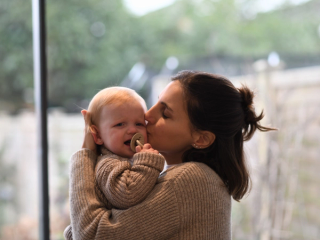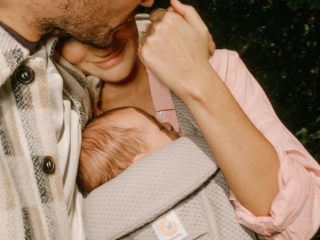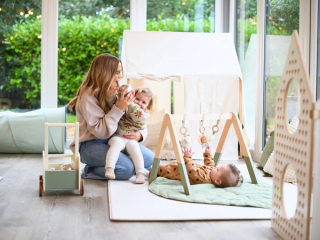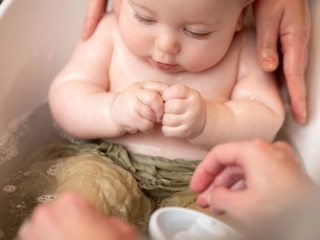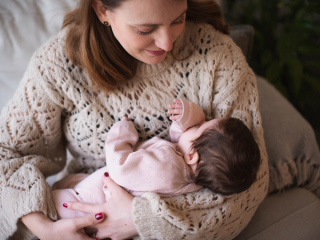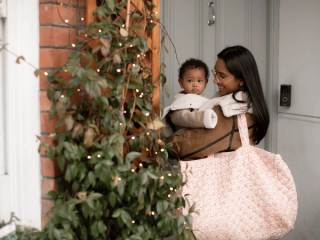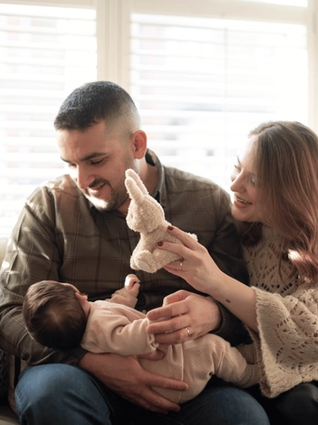
- Home
- Advice Hub
- Newborn
- New Parent Support
- What Is The Fourth Trimester?
What Is The Fourth Trimester?
Learn about the fourth trimester, a crucial time for newborns and parents. Understand its challenges, bonding moments, and tips for a smoother transition.
How long is the 4th trimester?
Looking after your baby in the fourth trimester
What’s happening with your baby during the fourth trimester?
Looking after yourself in the fourth trimester
Physical recovery and when to see a doctor
Mental recovery and when to see a professional
Maintain a balanced diet
Peer support and baby groups
Do, Ditch, Delegate
Throughout your pregnancy, you’ve measured the passing of time in trimesters. Now that your baby is here, it can be helpful to think of the first three months of their life as the fourth trimester. It’s a period of transition between pregnancy and parenthood for you, and from life inside the womb to the outside world for your baby.
How long is the 4th trimester?
The fourth trimester is another three-month period, during which you will be recovering from pregnancy and birth and getting used to having a newborn. Lots is happening during this trimester, with your little one changing daily, so don’t worry if you’re struggling to keep up with everything. Life will settle down again soon, but for now you are in a huge period of adjustment.
Looking after your baby in the fourth trimester
Until very recently, your baby was permanently cocooned in your womb, with limited room to move, food on tap, the constant sound of your heartbeat in their ears and all other sounds muffled. The outside world, by contrast, is a sensory explosion. Everything sounds different, everything looks different, everything feels different. Their only constant is you. It’s no wonder they might seem a bit ‘clingy’.
Their vision also improves dramatically in this fourth trimester. By three months old, they’ll be making eye contact, returning smiles and communicating with you – not with actual words, but through their body language, crying, cooing and gurgling. It’s all pretty amazing really! And exhausting – which is why newborn babies sleep so much, although, sadly, not often for the long stretches we would like them to sleep for.
You can help your baby adjust to the outside world by spending plenty of time cuddling them – skin to skin is ideal, where possible. This helps build your connection and is soothing for your baby, who is used to hearing and feeling your heartbeat from inside your womb.
Swaddling can help your little one feel more secure. It mimics the closed-in feeling of being in the womb and prevents them being startled by their own body movements. You should practice safe swaddling by following guidance to ensure your baby stays safe.
You can start bathing your baby as soon as you like, but while they’re adjusting to life outside the womb in the first few days you might be better off ‘topping and tailing’ with warm water and cotton wool. Newborns don’t need a daily bath – two or three times a week is plenty. But if you all enjoy bathtime there’s no reason not to make it part of your nighttime routine.
Newborns don’t need a routine. Feed them when they are hungry, whether you’re breast or bottle feeding. You can’t spoil a newborn, so don’t worry about creating a ‘rod for your own back’ by being ‘too responsive’. It’s good to learn your baby’s cues and react accordingly.
What’s happening with your baby during the fourth trimester?
Growth
Your baby’s body is growing fast, and their brain is developing at an amazing rate. By their second month, they are learning to use their bodies – grabbing at toys and people (and earrings if you let them!). You can take your baby to be weighed to see how their growth is progressing. Their weight can be recorded in your red book, giving you an idea of what centile they’re on.
Finding meaning in sound
To begin with, babies can hear but can’t distinguish sounds very easily. But you’ll notice over this first three months that they begin to associate sounds with people or activities and will turn their head towards familiar noises.
Vision improvement
Babies’ sight is not well developed at first and it will take a few months before their distance vision improves. Babies find it easier to see contrasts than colours, which is why black and white toys and books are marketed at newborns.
Body language
Your baby’s body language is your best indicator of how they’re feeling. Arching backs can signify tummy pain, kicking legs might be happiness or an expression of frustration, tugging on their ears might be a sign of an ear infection or teething pain, while the jerky arms (Moro reflex) is not usually an indicator of anything – unless they’ve been startled by something. Every baby is different and will have their own ‘language’ – don’t be disheartened if it takes a little while to learn yours.
Looking after yourself in the fourth trimester
Whether you’re recovering from a C-Section , or a vaginal delivery , a long labour or a short one, it’s really important to look after yourself in these early weeks. Drink plenty of water, rest as much as you can, and try to maintain a healthy, balanced diet. Giving birth is physically and emotionally exhausting. It can be euphoric and it can be traumatic. Please don’t assume that just because ‘everyone does it’, it’s easy to move on.
Physical recovery and when to see a doctor
Your physical recovery postpartum will depend largely on what kind of birth you had. You will be under the care of a midwife for at least the first 10 days, and then a health visitor after that. They should ask you questions about your postpartum bleeding, how well any wounds are healing (for example if you had perineal stitches or a C-section) and how you’re managing with going to the toilet. Bowel movements can slow down after birth and you really don’t want to end up constipated, so make sure you’re keeping your fluids and getting plenty of fibre in your diet. If you are suffering, don’t be embarrassed. Your doctor can prescribe you with laxatives to ease bowel movements – better to start these sooner rather than later.
If you notice itching and swelling around a wound site, a bad odour or discharge, see your healthcare professional. They will want to make sure you haven’t got an infection.
Mental recovery and when to see a professional
Most new parents find themselves overwhelmed, exhausted and anxious at some point in these early weeks after the birth. With hormones still all over the place, your emotions are bound to sit much closer to the surface than usual. But if you find yourself struggling to connect with your baby or your partner, or you’re feeling really low, don’t suffer in silence. Talk to your midwife, health visitor or GP. Postpartum depression is surprisingly common and nothing to be ashamed of, but the first step to getting help is to tell someone how you’re feeling.
Maintain a balanced diet
Eating well is probably not at the top of your priority list as you adjust to life with a newborn, but it is really important. Getting the right nutrients into your body at this challenging time will help give you the energy you need to face the long days and nights ahead. Check out our article on foods for new parents for more information.
Keeping healthy snacks on hand will also help stop you reaching for sugary treats when you’re feeling worn out. Delicious as they are, they feed into a vicious cycle of highs and lows that can leave you feeling permanently exhausted.
Peer support and baby groups
Though it’s true that your baby doesn’t need a lot of outside stimulation in these early months – they will get plenty of that from being with you and doing everyday things – it’s really good for you to be among other people going through the same things you’re going through: the sleepless nights, feeding worries, leaky nappies. You’ve been completely thrown out of your normal routine, so try and find a new one that works for you.
“I was so keen to get out the house and go to classes,” says HiPP mum Kirsten. “She slept all the way through our first baby sensory class and took zero interest in me waving shakers in her face. But I enjoyed the outing and being with some like-minded parents, who I could compare feed timings and nappy changes with!”
HiPP mum Shelly agrees: “I started attending a local baby class when Archie was around 2 months old. When you’re on maternity leave, it can sometimes feel quite isolating – especially when your partner goes back to work. Not many of my friends had children of a similar age at the time, so I knew I had to get out there and meet other mums who were experiencing the same things as me. Plus, I thought it would be a great way to start getting Archie to socialise with other children before he started nursery. I was initially very nervous – I was worried I would be judged by the other mums, that I’d discover I wasn’t doing the right thing, or that Archie wasn’t developing as fast as their babies. But how wrong I was! It gave me great comfort to discover that we were all feeling the same way and just trying to do our best. We’d sing songs, dance, do tummy time and baby yoga, all while having a natter and laughing at what new things our little ones were doing. It really helped build up my self-confidence and reassured me that I definitely wasn’t alone.”
HiPP mum Laura also agrees, but urges new mums not to overschedule themselves. “Don’t feel pressured into spending all your time out visiting. It is lovely, but so is sitting at home as a family soaking in every tiny little thing your baby does!”
Do, Ditch, Delegate
Though you’re not at work for the foreseeable future, you can still take some of the lessons from the office and apply them at home. Your life is not going to look like it used to, so you’re probably going to have to adjust your approach to household chores and life admin. Think about what’s really important to you (the ‘do’ list), whether it’s feasible to stay on top of it yourself, or whether you can delegate (or outsource) to someone else. Some things – like ironing! – might just have to drop off the list altogether.
Perhaps you were super organised in your third trimester and managed to put meals in the freezer to sustain you during this period. If not, look for some quick and healthy recipe ideas that will help you keep your strength up.
“I tried to prep lunch the night before, so I would always have something decent to eat,” says Karen. “Same for bottles, breast pumps, etc. – making sure they were clean and sterile at the end of every day saved me the stress of last-minute, one-handed washing up.”
A whole lot of firsts
First steps and first words are still a long way off, but when you’re a first-time parent there are so many milestones – many of which don’t have pretty milestone cards for you to share on social media. First time leaving the house. First time solo parenting. First time changing your baby’s nappy away from home. All of these are natural steps as you adapt to life with a newborn, and every one is a moment to be proud of.
Is there a milestone card for ‘breastfed in public for the first time’? There should be! Laura says: “Breastfeeding in public on my own for the first time was a big milestone for me, it felt so empowering!”, while Kirsten remembers, “I was so anxious about breastfeeding and even more so in public. I first did it sat on a bench with my NCT friends in a park. They were there to help, arrange muslins and pass me my drink. From this moment on, I got a lot more confident with every feed!”
Breastfeeding in public can be daunting – especially if you’re still getting the hang of latching baby on. Don’t be put off by what anyone around you might be thinking. With the right clothes (multiple layers will do the trick) and/or accessories (like a well-placed muslin), you can breastfeed very discretely, if you want to. Or don’t – it’s nobody’s business but your own, and a few inches of bared flesh is not going to do anyone any harm. Either way, every time you practice, it will get a bit easier.
Important Notice
We recognise that breastfeeding is best, providing many benefits to both mothers and infants. We also recognise that every parenting journey is unique, and we are here to support you through this journey, however you choose to feed your baby.
If you choose to breastfeed it is important that you eat a healthy well-balanced diet in preparation for and during breastfeeding. Before deciding to combination or formula feed your baby, note that reducing or stopping breastfeeding can be difficult to reverse. Babies feed on demand, so replacing breastfeeding with infant formula milk may reduce your supply. Formula feeding has both social and financial implications. Talk to your midwife or health visitor for guidance and support.
If you choose to use formula milk, make sure you choose the right milk for your baby’s age and prepare and store it according to the instructions on the packaging. Not doing so may make your baby ill. Infant formula is a nutritionally complete breastmilk substitute that can be used from birth. From 6 months you can choose to use follow on milk as part of a mixed diet and from 12 months you have the option to move onto growing up milk alongside a balanced diet.

